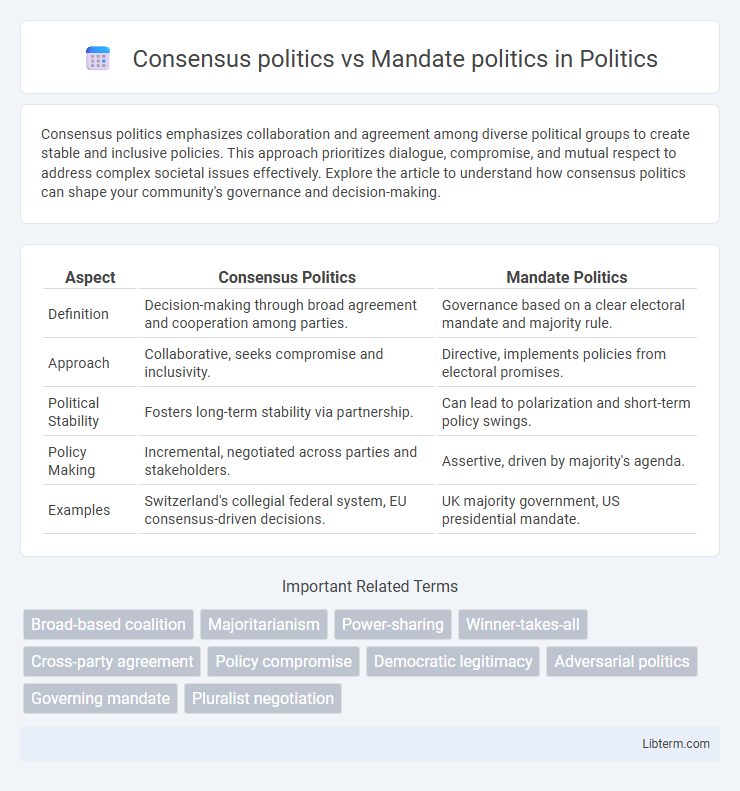Consensus politics emphasizes collaboration and agreement among diverse political groups to create stable and inclusive policies. This approach prioritizes dialogue, compromise, and mutual respect to address complex societal issues effectively. Explore the article to understand how consensus politics can shape your community's governance and decision-making.
Table of Comparison
| Aspect | Consensus Politics | Mandate Politics |
|---|---|---|
| Definition | Decision-making through broad agreement and cooperation among parties. | Governance based on a clear electoral mandate and majority rule. |
| Approach | Collaborative, seeks compromise and inclusivity. | Directive, implements policies from electoral promises. |
| Political Stability | Fosters long-term stability via partnership. | Can lead to polarization and short-term policy swings. |
| Policy Making | Incremental, negotiated across parties and stakeholders. | Assertive, driven by majority's agenda. |
| Examples | Switzerland's collegial federal system, EU consensus-driven decisions. | UK majority government, US presidential mandate. |
Defining Consensus Politics
Consensus politics emphasizes broad agreement and compromise among multiple political parties and stakeholders to achieve policy stability and social cohesion. It seeks inclusive decision-making processes that minimize conflict by incorporating diverse viewpoints, often resulting in incremental policy changes. This approach contrasts with mandate politics, which prioritizes a clear electoral mandate to implement a specific political agenda decisively.
Understanding Mandate Politics
Mandate politics centers on the principle that elected representatives possess a clear directive from the electorate to implement specific policies, emphasizing decisive government action and accountability. This approach contrasts with consensus politics, where broad agreement and compromise among diverse political actors are prioritized to reflect a wider range of interests. Understanding mandate politics requires recognizing its focus on majority rule and clear policy mandates derived from electoral victories, often at the expense of bipartisan collaboration.
Historical Origins of Both Approaches
Consensus politics traces back to post-World War II Europe, where cross-party cooperation was essential for reconstruction and economic stability, exemplified by the establishment of welfare states in countries like Germany and the Netherlands. Mandate politics originated during the democratic expansions of the 19th and 20th centuries, emphasizing the electoral mandate given to a ruling party or leader to implement specific policies, as seen in the rise of parliamentary majorities in the United Kingdom and the United States. These historical origins highlight the contrasting foundations: consensus politics prioritizes inclusive governance and compromise, while mandate politics centers on decisive action based on electoral legitimacy.
Key Principles of Consensus Governance
Consensus governance emphasizes inclusive decision-making, prioritizing broad agreement among diverse stakeholders to ensure policies reflect collective interests. Key principles include power-sharing, transparency, and collaborative negotiation, which foster stability and mutual trust within political systems. This approach contrasts with mandate politics, where decisions derive primarily from majority rule, often sidelining minority voices.
Core Features of Mandate Politics
Mandate politics centers on clear, decisive electoral promises providing a direct endorsement for specific policies, emphasizing accountability and strong leadership. Core features include a clear policy agenda based on campaign commitments, the expectation that elected officials will implement promised actions, and the reliance on popular support to legitimize governing authority. This approach contrasts with consensus politics, which prioritizes broad agreement and compromise among diverse political groups.
Advantages of Consensus Decision-Making
Consensus decision-making enhances political stability by fostering inclusive dialogue among diverse groups, reducing conflicts and promoting long-term cooperation. It encourages broader participation and representation, ensuring policies reflect a wider range of interests and values, which increases legitimacy and public support. This approach improves the quality of decisions by integrating multiple perspectives, leading to more balanced and sustainable outcomes.
Challenges of Mandate-Based Leadership
Mandate-based leadership often faces challenges such as increased polarization and reduced collaboration, as leaders pursue agendas with strong electoral backing that may alienate opposition groups. This approach can undermine long-term policy stability and complicate governance when facing institutional checks or diverse public interests. Persistent majoritarian tactics risk eroding democratic norms by sidelining minority viewpoints and limiting inclusive decision-making.
Impact on Policy Formation and Implementation
Consensus politics fosters inclusive decision-making by encouraging collaboration among diverse political actors, resulting in policies that reflect broader societal interests and have higher chances of successful implementation. Mandate politics centers on a clear electoral mandate, enabling swift policy formation and decisive implementation but potentially risking exclusion of opposing views and reduced adaptability. The impact on policy formation varies, with consensus politics promoting stability and long-term planning, while mandate politics often drives rapid, result-oriented policy actions.
Global Examples of Consensus and Mandate Politics
Consensus politics emphasizes broad agreement and collaboration among diverse political groups, exemplified by Switzerland's consociational democracy and the Netherlands' coalition-based governance. Mandate politics centers on strong electoral mandates and decisive policy implementation, as seen in the United States under presidents with clear majorities like Franklin D. Roosevelt's New Deal or more recently, Emmanuel Macron's La Republique En Marche in France. These global examples highlight how consensus politics promotes inclusivity and stability, while mandate politics drives rapid reform and clear policy direction.
Future Prospects: Blending Consensus with Mandate
Future prospects in political governance involve integrating consensus politics, which emphasizes broad agreement and collaboration, with mandate politics that prioritize decisive leadership based on electoral mandates. Combining these approaches can enhance policy stability and democratic legitimacy by fostering inclusive decision-making while respecting voter intentions. This blend supports adaptive governance responsive to complex societal needs and evolving political landscapes.
Consensus politics Infographic

 libterm.com
libterm.com